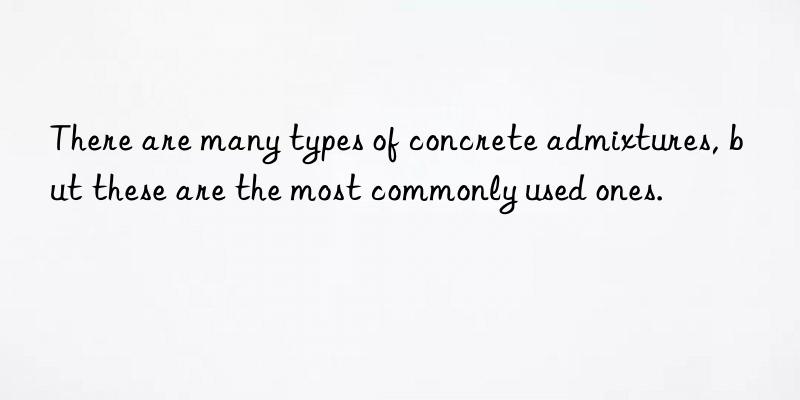
Concrete admixtures can improve and adjust the properties of concrete and are also one of the indispensable components of concrete. Their use is an important method and technology for modifying concrete. And it is receiving more and more attention in today's projects. The addition of admixtures plays a certain role in improving the performance of concrete. Admixtures do not significantly improve the performance of concrete. If the slump loss of concrete is too large or the concrete sets too quickly, the addition of admixtures will Agents make concrete structural members more susceptible to cracks. However, the selection, addition method and adaptability of admixtures will seriously affect its development. Appropriate admixtures should be selected based on the properties of the concrete itself and the surrounding environment. Otherwise, quality problems may cause hidden dangers to the quality of the project, and even engineering accidents may occur, causing significant economic losses.
Common types of concrete admixtures
Water-reducing admixtures
Water-reducing admixtures can reduce the amount of mixing water while maintaining the slump of concrete. Improve the fluidity of concrete mixture, or reduce the cement consumption per unit and save cement. According to the water-reducing ability of water-reducing agents, they are divided into ordinary water-reducing agents (also called plasticizers, the water-reducing rate is not less than 8%), high-efficiency water-reducing agents (also called superplasticizers, the water-reducing rate is not less than 14%) and High-performance water-reducing agent (water-reducing rate not less than 25%).
Among them, high-efficiency water-reducing agent: powder dosage is 0.75%~1.5%, liquid dosage is 1.5%~2.5%; when using porous aggregate, it is advisable to add water and stir first, then add water-reducing agent; when slumping When the intensity is high, care should be taken not to take the vibrating time too long to prevent bleeding and delamination. High-performance water-reducing agent: the common dosage is 0.4% to 1.2%; a concrete trial mix test should be carried out before use to obtain the optimal dosage; it cannot be used in combination with naphthalene series high-efficiency water-reducing agent, nor with other concrete admixtures. Concrete compatibility tests should be carried out in advance before use; slump is highly sensitive to water consumption, and water consumption must be strictly controlled during use; pay attention to concrete surface maintenance.
Second early strength agent
Concrete early strength agent can improve the early strength of concrete and has no significant impact on the later strength. The main function of early strength agent is to accelerate the hydration rate of cement, and it also has certain water reduction and enhancement functions.
Scope of application: The early-strength agent does not contain chloride ions and has no corrosion effect on steel bars. It is suitable for all civil and industrial buildings and prestressed reinforced concrete components, mortars, etc.; the early-strength agent is suitable for use at low temperatures (early winter and early winter). Construction in early spring) conditions; it is used for Portland cement, and its strengthening and modification effects on slag cement are particularly significant. Instructions for use: The dosage is generally 3% to 6% of cement; in order to maintain uniform quality of concrete, the mixing time is extended by 1 to 2 minutes; if the early strength agent is damp and agglomerated, it must be crushed or weathered before use, and its performance will not be Change.
Three retarder
Retarder is also a kind of admixture. It mainly prolongs the hydration and hardening time of cement or gypsum by reducing the hydration speed and heat of hydration. , so that fresh concrete can maintain plasticity for a longer period of time, thereby adjusting the setting time of fresh concrete. The dosage is 0.1% to 0.6% of the cement dosage, and is suitable for continuous pouring of concrete, large-volume concrete, ready-mixed concrete and pumped concrete under high temperature conditions.
Four air-entraining agents
Air-entraining agents can improve the slump, fluidity and plasticity of concrete, making the concrete have good bubble structure, small bubble radius and high frost resistance index. It is commonly used in Highly durable concrete structures (such as dams, high-grade highways, ports, etc.) are also commonly used concrete admixtures to improve the durability of concrete pavements. The dosage of AH-1 is 0.01%~0.03%, which is suitable for general anti-seepage, anti-freeze and durable concrete; the dosage of AH-2 is 0.6%~0.7%, which is suitable for pumping concrete construction.
Five expansion agents
Expansion agents are mainly used to compensate for the shrinkage of materials during hardening and prevent concrete from cracking. The dosage of concrete expansion agent is 10%~12% (based on the amount of cement). For concrete that requires higher impermeability and crack resistance, the dosage can be increased through experiments. Before the initial setting of the concrete, the relevant construction regulations should be followed, and the concrete surface should be repeatedly pressed to prevent air drying and avoid cracks caused by settlement. Curing should be started after the final setting, and the curing period should not be less than 12 days. Expanding agents should be tested with local cement before use.
The above five are common concrete admixtures. I hope they will be helpful to you.
</p


